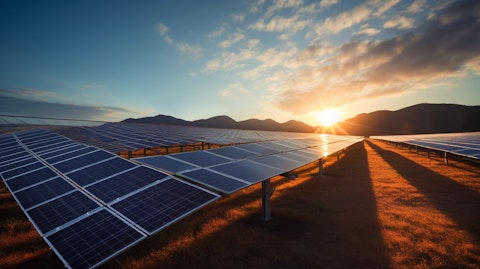We recently published a list of 8 Best Climate Change Stocks To Invest In Right Now. In this article, we are going to take a look at where Canadian Solar Inc. (NASDAQ:CSIQ) stands against other best climate change stocks.
According to a report by the World Meteorological Organization (WMO), the state of the climate in 2023 was marked by record-breaking levels of greenhouse gas emissions, ocean heat, sea level rise, and extreme weather events. The observed concentrations of carbon dioxide, methane, and nitrous oxide reached record levels in 2022 and continued to increase in 2023. CO2 levels are now 50% higher than in the pre-industrial era, trapping heat in the atmosphere and contributing to the long-term increase in global temperature.
The global mean near-surface temperature in 2023 was 1.45°C above the pre-industrial 1850-1900 average, making it the warmest year on record. Sea level rise also continued to accelerate, with global mean sea level reaching a record high in the satellite record (since 1993). This reflects continued ocean warming and the melting of glaciers and ice sheets. The rate of global mean sea level rise in the past ten years (2014-2023) is more than twice the rate of sea level rise in the first decade of the satellite record (1993-2002).
Extreme weather and climate events had major socio-economic impacts on all inhabited continents, including major floods, tropical cyclones, extreme heat, and drought. The number of people who are acutely food insecure worldwide has more than doubled, from 149 million people before the COVID-19 pandemic to 333 million people in 2023. Weather and climate hazards continued to trigger displacement, with 1.8 million people displaced across Ethiopia, Burundi, South Sudan, Tanzania, Uganda, Somalia, and Kenya in addition to the 3 million people displaced internally or across borders by the five consecutive seasons of drought in Ethiopia, Kenya, Djibouti, and Somalia.
READ ALSO: 10 Best Nuclear Energy Stocks To Invest In Now and 10 Most Profitable Renewable Energy Stocks Now.
Hedge Funds Bet Against the Green Economy
According to a report published by Bloomberg on October 21, hedge funds are increasingly betting against the green economy despite significant global investments in clean energy and green technologies. Analysis of data from Hazeltree, which tracks disclosures from roughly 500 hedge funds, reveals that more funds are net short on green sectors such as solar, electric vehicles (EVs), batteries, and hydrogen than are net long. Conversely, fossil fuel sectors such as oil, gas, and coal have attracted more long bets. This shift reflects skepticism about the profitability and short-term viability of green investments, even as governments and scientists emphasize their necessity for addressing climate change.
Higher interest rates have made capital-intensive projects such as offshore wind farms less viable, while geopolitical tensions, particularly around China’s dominance in green technology supply chains, have deterred investments in areas like solar energy and EVs.
Solar energy has seen a sharp decline, with hedge funds shorting 77% of companies in the Invesco Solar ETF as of the third quarter of 2024, compared to 33% in early 2021, when momentum for the green transition hit a peak. However, US-based companies that avoid reliance on China-dominated technologies, are exceptions. Similarly, the EV and battery sectors have seen a slowdown, with net short positions exceeding longs on 55% of companies in relevant ETFs.
Fossil fuels, by contrast, have gained favor. Hedge funds are long on 53% of companies in the S&P Global Oil Index and 73% of major thermal coal companies. Rising global energy consumption and geopolitical instability have bolstered the case for these investments, even as green energy struggles to meet demand reliably. Hedge fund managers argue that fossil fuels remain essential for stable energy supplies.
Hedge funds have shown optimism about wind energy, with long bets on nearly 60% of companies in the First Trust Global Wind Energy ETF, supported by growing government orders. Power infrastructure, including transmission grids, has also attracted interest, with long bets outnumbering shorts on 65% of companies in the sector. This sub-sector is considered crucial for meeting increasing electricity demands, including those driven by AI data centers.
As the energy landscape continues to evolve, investors are closely watching the impact of the new administration on the renewable energy sector. With the global demand for clean energy on the rise and innovation in renewable technologies driving growth, the sector’s long-term outlook remains compelling.

A fleet of solar power plants under the dazzling sun, shooting off a burst of light.
Our Methodology
To compile our list of the 8 best climate change stocks to invest in right now, we sifted through internet rankings to find the 20 largest companies that focus on addressing climate change through their products, services, or operations. From that list, we narrowed our choices to the 8 stocks that analysts see the most upside to. The list is sorted in ascending order of analysts’ average upside potential, as of November 19.
Why do we care about what hedge funds do? The reason is simple: our research has shown that we can outperform the market by imitating the top stock picks of the best hedge funds. Our quarterly newsletter’s strategy selects 14 small-cap and large-cap stocks every quarter and has returned 275% since May 2014, beating its benchmark by 150 percentage points (see more details here).
Canadian Solar Inc. (NASDAQ:CSIQ)
Upside Potential: 75.34%
Canadian Solar Inc. (NASDAQ:CSIQ) is one of the world’s largest solar technology and renewable energy companies, offering high-performance solar modules and battery storage solutions. The company has subsidiaries in 23 countries and regions with over 26 manufacturing facilities in Asia & Americas.
On October 31, Recurrent Energy, a subsidiary of Canadian Solar Inc. (NASDAQ:CSIQ), announced that its 134 MW Liberty Solar project in Texas reached commercial operation. The project will produce enough energy to power approximately 15,000 homes annually. The Liberty Solar project has secured four major corporate customers, including Autodesk, Inc., Biogen Inc., EMD Electronics, and Wayfair Inc., who will purchase renewable energy from the project. Recurrent Energy will remain the long-term owner and operator of the project.
Recurrent Energy also announced that it has signed two new 20-year tolling agreements with Arizona Public Service Company (APS). These agreements cover the Desert Bloom Storage and Papago Solar projects, both located in Maricopa County, Arizona. The Desert Bloom Storage project is a 600 MWh standalone storage facility, while the Papago Solar project is a 150 MWac solar facility.
Both projects are scheduled to start construction in 2025 and reach operation in 2026. This announcement follows an agreement last year, with APS for the 1,200 MWh Papago Storage project, which is currently under construction and expected to commence operations in 2025. Once operational, Papago Storage will be the largest standalone energy storage project in Arizona.
The three tolling agreements with APS will total 1,800 MWh of energy storage and 150 MWac of solar capacity. This is a significant amount of energy, enough to dispatch the equivalent of 72,000 homes for four hours and enough solar to power the equivalent of approximately 24,000 homes per year.
Overall, CSIQ ranks 4th on our list of best climate change stocks to invest in right now. While we acknowledge the potential of CSIQ to grow, our conviction lies in the belief that AI stocks hold greater promise for delivering higher returns and doing so within a shorter time frame. If you are looking for an AI stock that is more promising than CSIQ but that trades at less than 5 times its earnings, check out our report about the cheapest AI stock.
READ NEXT: 8 Best Wide Moat Stocks to Buy Now and 30 Most Important AI Stocks According to BlackRock.
Disclosure: None. This article is originally published at Insider Monkey.





